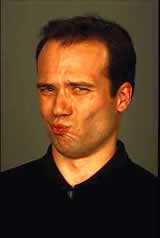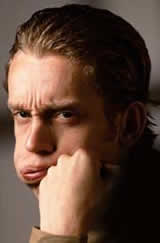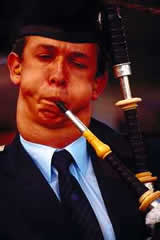|
|
|
Parafunctions
Piero
Silvestrini, M.D., Ph. D., D. S.
|
One
of the universally accepted causative co-factors arousing
gnathologic problems are parafuntions, i.e. vicious behaviors
repeated and perpetuated over time, leading to overload
of teeth, muscle and joint structures. Common examples
are lip biting, keeping a stick or a pen in the mouth,
resting the chin on the palm, nail biting, digital sucking,
nervous cheek popping, clenching, playing a musical instrument,
etc.
Ma
ci sono parafunzioni più subdole, che si svolgono
senza che ce ne accorgiamo, come digrignare i denti di
notte, sempre nel sonno serrarli fortemente, tenerli appoggiati
fra loro costantemente anche di giorno, deglutire in modo
anomalo ecc.
|
_ |
|
| |
|
Parafunction:
lip biting
|
 |
 |
 |
|
Parafunction:
frequent facial tics (grimacing)
|
Parafunction:
frequently resting the chin on the palm
|
Parafunction:
in predisposed subjects, even playing a musical instrument
may cause injury
|
|
|
However,
other subtle parafunctions may occur unconsciously, as bruxing
at night, teeth grinding in sleep, constant teeth clenching
even during the day, abnormal swallowing, etc.
These behaviors will lead, on the one side to the development
of the involved muscles as a result of a hyperfunction,
and on the other to teeth and joint overloading which, sooner
or later, will derange the mandibular system.
There ia a multitude of parafunctions and only a careful
analysis of the patient will reveal their importance .
|
| |
|
|
|
Self-test
on parafunctions
|
yes
|
no
|
|
1.
|
Do
you have a lip biting habit? |
|
|
|
2.
|
Are
you biting your nails obsessively? |
|
|
|
3.
|
Have
you got facial tics? |
|
|
|
4.
|
Do
you clench your teeth uncosciously during the day? |
|
|
|
5.
|
Are
you a professional woodwind or violin player or singer? |
|
|
|
6.
|
Are
you usually resting your chin on the palm? |
|
|
|
7.
|
Do
you sleep in the prone position? |
|
|
|
8.
|
Have
you the habit of keeping your teeth clenched? |
|
|
|
9.
|
Have
you the habit of grimacing with your lips or tongue? |
|
|
|
10.
|
Do
you grind your teeth at night (loudly)? |
|
|
If
you have scored more than 4 "YES", it is important to try to reduce
parafunctional intensity and frequency, since your risk to overload
your muscle and joint structures is significant.
|
| |
|
|